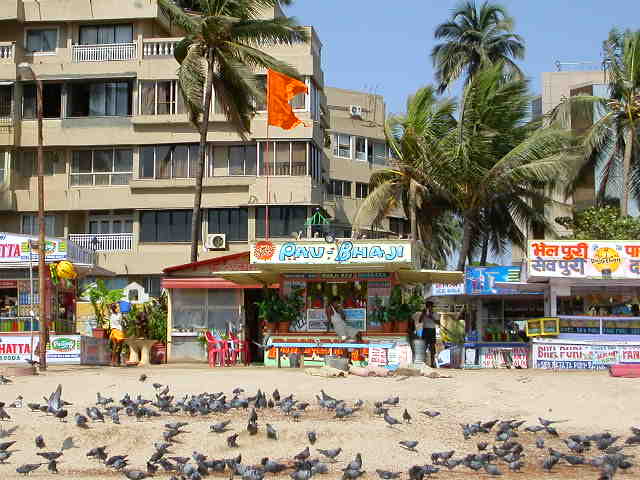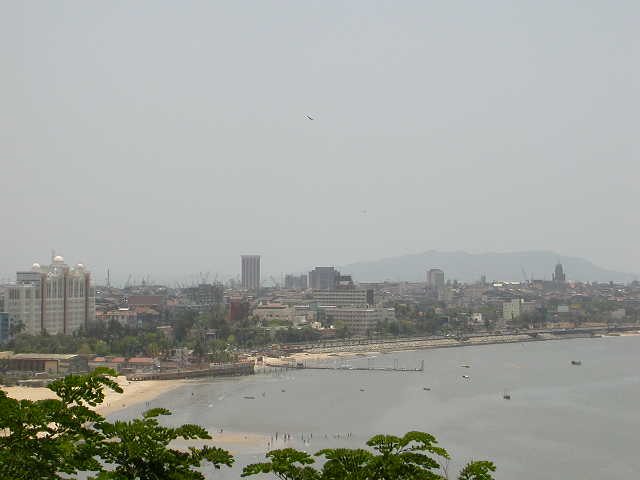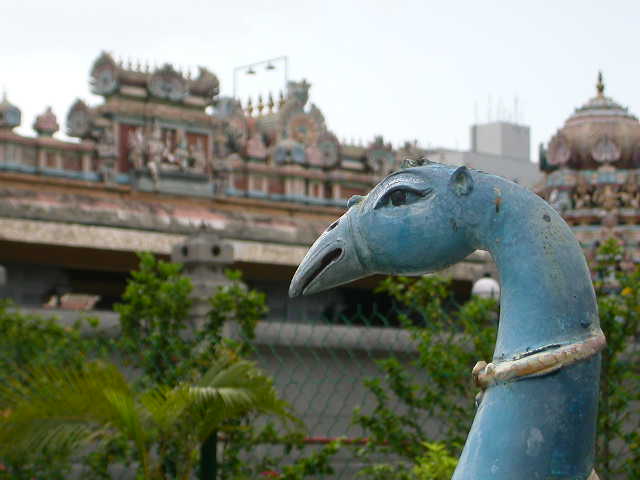|
"INDIANS WILL NEVER FEEL OUT OF PLACE IN SINGAPORE," wrote S. Ramanujacharya on HinduOnNet, and reflecting the general Indian consensus on the verdant island republic. "One of the national languages is Tamil and Serangoon is called 'little India' (I can't imagine why, since it's so clean as to be unlike any Indian town!) Temples and mosques are available everywhere, and there is even a fire temple where Parsis can worship. There are various cultural associations so if you go to work there you will never feel homesick. You can get born, married and give up your ghost much as you would at your own native village and not know the difference! Do not feel disconcerted if a Chinese policeman addresses you in chaste Tamil,since many can speak the language, and there are a large number of Chinese Hindus as well!"
India has entered the Era of Gloablization in a big way and from Tokyo to the US and Canada and Australia, Indians can be found looking for jobs and pitching their business ideas. Singapore has emerged as one of the favorite destinations for Indian jobseekers, and a relationship has developed which benefits both partners.
This is from the Financial Express: SINGAPORE ROLLS OUT RED CARPET FOR INDIAN TECHIES' IDEAS (October 17 2005):
Unable to take advantage of the growing labour-intensive business process outsourcing (BPO) services market like India and China, Singapore has started providing incubator services to individuals with ideas in a big way. Singapore minister for manpower and second minister for defence NG Egn Hen says, E½gIn Singapore, one can test one's idea. The successful experiments can subsequently be replicated on a large scale to feed bigger markets.
"The government, according to the minister, wants entrepreneurs in the knowledge sector to use the facilities provided in the city state as a launching pad in pursuance of bigger dreams.
"What is significant about hosts of industrial parks and incubator centres is that one can spot significant number of Indians, especially the information technology experts, pursuing their ideas in diverse fields as information technology, embedded software, biotechnology, engineering services, industrial design, etc. The Indian entrepreneurs find it easier to work in Singapore which houses 1,526 Indian firms. These include large Indian corporations, technology enterprises and start-ups. The prominent Indian companies which have significant presence in Singapore include TCS, Satyam, Bilcare, Dr Rao Holdings, VSNL and NIIT.
"The latest addition to the series of technology parks to help start-ups is Fusionpolis which is expected to be completed by the second half of 2007. Fusionpolis, according to Mr Philip Su, assistance CEO, JTC Corporation, "is the second major development in the One-North research and innovation hub after Biopolis." The JTC, it may be mentioned, has developed 7,000 hectares of industrial land and over 4 million square meters of ready-built factory space. Currently, the corporation has under its management 39 industrial and specialised parks which include four water fab parks and an advanced display park, two business parks, a chemicals hub, a biomedical park and logistic hubs for air, chemical and general warehousing industries. Together, they house about 7,000 local and foreign companies.
"According to Mr Philip, the twin-tower Fusionpolis, which is being developed at a cost of S$ 560 million, will be the first integrated work-live-play-learn development in the One-north, SingaporeE½fs icon of the knowledge economy. It will have work-live apartments, fitness club, technology showcase, experimental theatre, media studios and retail outlets in addition to work place. The complex, he said would emerge as the hub for test-bedding of the latest technologies in the areas of infocom and media, environmental technology and construction..."
Bridge Singapore reported: "
Without pausing for thought Mohan Aiyer, 40, gave a resounding "yes" when asked whether he would be interested in doing an executive MBA programme with the Indian Institute of Management-Bangalore (IIM-B) when it opens an offshore Asian campus in Singapore later this year.
"Of course, I'll do the course. They're number one and have been long established. Getting an IIM education would be a very good thing for anybody, primarily because the people who come out of these institutions go on to become role models globally," says the Indian-born entrepreneur, who has been living and working in Singapore for the past seven years.
"Look at the 'Indian corporate mafia' ruling the American corporate world now - they all fundamentally come from IIMs."
Mr Aiyer's "Indian corporate mafia" consists of graduates of the institutions who have become ambassadors of the IIM brand in industry, finance and academia, both within India and abroad.
This makes the six IIMs in India - like their counterparts in technology education - renowned institutions with world-class standing.
Now IIM-B - the business school in India's Silicon Valley of Bangalore - hopes to export its strength in business strategy and finance by offering an online EMBA programme, targeted for November or December, at its Singapore campus.
The initiative will be hosted at Bhavan's Indian International School, with the institute sharing its lecture halls, seminar and conference rooms, library and computer centre.
At the moment, there are plans to offer only a virtual, part-time EMBA course, which can be completed over a year and a half. However, more courses may be added as the school establishes its presence in the city-state.
"The EMBA course modules would be taught online, with nearly all the faculty members, in terms of teaching staff, working out of our Indian campus," says Prakash Apte, director of IIM-Bangalore, which counts the UK engineering company BAE among its long-standing clients for executive education.
"But we're also looking at hiring locally-based faculty members depending on demand," he adds.
Admission procedure, course content and evaluation are the same as those of IIM-Bangalore. However, in terms of credit equivalence, the course is structured to lead to an EMBA certification, rather than a full degree.
Mr Apte says this is because the course focus is on broadening the outlook and strengthening the skills of practising ĆĀmanagers.
This is achieved by discussing the latest developments in management thinking and their applicability in the Indian and global context. Participants also obtain valuable insights from extensive online interaction with their counterparts from other organisations.
"Even though it may lead to just a certification, I strongly believe there would be demand for it given our brand equity," says Mr Apte.
"In any sense, the certification would be of very high value since the quality of the education will match the high standards of the teaching at the institute."
One of the notable features of an IIM education is the rigour of its teaching methods and processes. For the institute, one way of building on these strengths has been to widen its mandate with the launch of international student exchange programmes.
IIM-B runs exchange programmes with 20 global centres. The school says every year nearly 25 per cent of its graduates are headhunted or poached by multiĆĀnationals and offered sky-high salaries.
"The teaching you get there [at IIM] is value for money," says Mr Aiyer.
"The rationale behind the education system is not money-making. For them it's not about running a profitable organisation, but rather the aim is to create intellectuals. Therefore, the teaching staff is very dedicated. The pedagogy and curriculum are comparable to the best globally, while the fee is at a fraction."
As an overseas Indian national, Mr Aiyer fits the profile of the type of candidate the institute hopes to attract for its first EMBA. The initial enrolment target for this year is about 40 to 50 students.
IIM-B officials say that although there is growing demand from south-east and north-east Asia for Indian education because of the alluring status of IIMs, Singapore was chosen primarily for having a large Indian population.
"Although we're reaching out to the entire region, a large proportion of the students are likely to come from the Indians living and working around the region," says Mr Apte.
He adds: "Singapore is an excellent market; we are familiar with the business environment and the industry. Our MBA students are continuously engaged in exchange projects there. But more than that, there's a sizeable overseas Indian community working in Singapore who know us and our value."
While he would not comment on the cost of the EMBA, saying that the committee is still ironing out the pricing strategy, Mr Apte did say the tuition would be "priced competitively and is not going to be very high" when compared with other foreign institutions in higher business education.
IIM-B's biggest competition in Singapore will probably come from Insead and the Chicago Graduate School of Business. Both have well-established campuses in the city-state, offering full-time and part-time MBA and EMBA courses.
Insead charges about $108,000 for its EMBA, while the same course at Chicago costs about $103,000.
The standard fee for a two-year MBA graduate programme at any of the IIM schools in India is about $7,500, which administrators say is about half the actual cost incurred by the college. IIMs make up most of the difference with revenues from executive training programmes and government subsidies.
Although the regional market is large enough to accommodate many leading players, IIM-B's entry into Singapore is likely to up the ante for Insead and Chicago.
While the brand equity of IIM-B is strong and its reputation precedes it, the key challenge would be positioning itself distinctly from its heavyweight rivals, says Mr Apte.
"Of course, we would be seen as some degree of threat," he says.
"If you look at the global environment now, India is fast becoming an economic powerhouse. There is a great interest in the knowledge of the Indian economy, in Indian companies and the peculiarities of the Indian market. And this is what we can provide better than ĆĀChicago or Insead. Fundamentally, this is where our strong value-proposition lies."
Says Hindu On Net: "Jobbing for Work
If you have been offered a job in Singapore, try and make sure your housing needs are taken care of by your employer. They may need to shell out anything from S$ 4-6,000. It is possible to get a modest flat at a Housing Board Colony for S$1500, but the neighbourhood may not fit in with your lifestyle. The company generally picks up electricity and water bills. If you come from one of the hot dry places in the country, be sure that the air conditioning is working well in your flat, as you will need it if you need sleep and rest to live! If you end up paying for yourself then budget for S$600 per month! Make certain your employer gives you full medical coverage and makes an allowance for transport.
"You can't drive too far in Singapore without falling off the side of the island! As its only 22miles across, the Singapore government likes to give residents the feeling that the place is as large as a normal country. To do this they have arranged a series of one-way roads that necessitates a drive of about 30 miles to go to your neighbour's house for dinner! Parts of town are no drive areas for cars with less than four people inside unless you pay for a special permit. Parking cost the earth so its better not to buy a car. In fact it's the intention of the government to keep the numbers of vehicles down! "
As Wikipedia reports: "Following Singapore independence in 1965, migration from India and other countries dwindled, and the Singapore population gradually acquired a more settled character. However, in the 1980s, a significant number of Indian Singaporeans began to migrate to Australia and other English-speaking developed countries. This was part of a minor brain drain from Singapore. Most emigrating families were middle class but culturally marginalised English-speaking minorities like the Peranakans, Eurasians, and gays.
"The loss of more successful Indian families in the 1980s has been somewhat balanced by the arrival of highly qualified professionals from India since the 1990s. From the 1990s, Singapore's policy has been actively to attract highly skilled migrants from around the world and this has produced a fairly large expatriate Indian community of well-educated and wealthy professional and business people. It remains to be seen how permanent this migration is. Most have retained their Indian citizenship, although some have been granted Permanent Residence status. Interaction between the local and expatriate Indian community remains ambivalent rather than easy and natural.
"Transient foreign workers who come to work in Singapore on short-stay work permits (two years validity, renewable) as unskilled or semi-skilled workers working in the as domestic workers and construction workers form a third Indian community. There is little interaction between this group and either the expatiate or local Indian communities."
Skilled Indians Shop for Jobs in Singapore>: By Ishani Duttagupta, The Economic Times.
"For many Indian professionals, it's now time to look East rather than go West. In fact, Singapore is turning into a hub for skilled and highly skilled Indians.
"Singapore's strategic skills list which is drawn up by the Ministry of Manpower (MOM), after consultations with industry and other government agencies, puts out the skills for which there is expected to be strong industry demand in the coming years. Job seekers can use this list to help plan their career.
"In view of the expected demand for, and shortage of people with such skills, the MOM also accords added consideration to work permit (Employment Pass and S Pass) applicants, possessing such skills. And in various sectors such as IT and banking and finance, Indian professionals are in high demand.
"'In Singapore, the banking-finance and IT sectors welcome Indians with open arms and many companies, banks and financial institutions have even started visiting Indian campuses. They understand that US is still the main attraction for young Indian professionals and hence they need to sell the idea of working in Singapore to that segment,' feels Amrit Barman, who works with Cisco Systems and is an active member of the IIT Alumni Association in Singapore.
"'In terms of positions, Indians don't start at the CEO positions since one needs to grow into it and the knowledge of the region is important. But in senior management roles such as heads of departments, there are many Indians. However, the largest demand is in the mid-management levels. In the IT sector, jobs are even available for Indian professionals with a few years of experience. That is the starting point and there is a huge demand for skilled Indian IT professionals here,' adds Mr Barman who has himself been living and working in Singapore since 1997.
"The hot sectors, she feels, for Indians seeking to move to Singapore are IT and telecom, manufacturing, oil & gas as well as banking and finance. gThe demand is very high in the mid- management areas. Senior exec positions are mostly filled internally by most companies as a career progression for their current high performers irrespective of the nationality,h adds Ms Alag Suri.
"The tax policy of Singapore is one of the factors that draws immigrants. In Singapore, there are two categories of expat workers, those on employment pass and others who are permanent residents. Tax levels are same for both categories, though permanent residents enjoy better tax subsidies.
"Singapore, in fact, has one of the most benign tax regimes in the world. At the very top end, the tax level is 22% and compared to India and the US, taxes work out much lower for professionals..."
Doctor Jobs: http://www.doctorjob.com.my/.
This is a resource for students and jobseekers in Malaysia. You can search for courses or colleges, find out entry requirements, apply for scholarships, and read national education news. And oh -- you can also look for jobs!
Expatriates -- Malaysia: http://expat3.securesites.net/classifieds/mly/.
Classifieds for jobs wanted and offered, housing, personals, language exchange and childcare.
GetAFreelancer: http://www.getafreelancer.com/.
Bodisatva B says (presumably somewhere in India!): "Try this site.. www.getafreelancer.com
I got a project for which i get 10K everytime I complete a project. I have complete 1 so far. Have 5K in my bank... and the remaining 5k i blew up on RAM..DVD writer.. :D
Already, 2 more have been queued up. 20K
more... ::droool::
Dudes, dont waste ur precious time on adsense.. get a real online part time job. :D I am not an advertiser for getafreelancer... I am just spreading the word coz I found it to be a "moneyplant" :P (Heard of the adage "money doesnt grow on trees...!")
Gulliver Resort Jobs: http://www.mygulliver.com/malaysia/.
At last count, search 437 jobs from 233 employers, on this job search site dedicated to hospitality jobs worldwide.
Intel Malaysia: http://www.intel.com/jobs/malaysia/.
Of course, as everybody knows, one of the jewels of the Malaysian job crowns is Intel -- or more specifically, IntelMalaysia, which now comprises three campuses and employs more than 8500 people. Read up here, and if you are interested, you could be one of those 8500 Intel souls! Over the past 30 years, in fact, Intel Malaysia has grown into the largest, most mature Intel manufacturing facility outside of the United States. Intel Penang is a key assembly and testing site, Intel Kulim assembles processor packaging and is an important operations center for mobile modules, and Intel Kuala Lumpur includes a multimedia super-corridor development center as well as a sales and marketing office. But whichever of these three Intel hubs that you end up, one thing is certain: you will be in a country which is a tropical paradise and a true melting pot, a land rich with a great deal of cultural diversity. Thus you have been informed!
Career streams at Intel Malaysia are divided into the following categories: integrated circuit engineering, integrated circuit manufacturing, hardware engineering, software engineering, hardware manufacturing, facilities and site services, Information Technology (IT), Finance, sales and marketing, ebusiness, supply network, materials, legal, human resources, research and development (r&d) and quality and reliability. If any of these job descriptions fit your bill, you should hit the Intel Malaysia site listed above, to search for positions.
JobsDB: http://www.jobsdb.com/MY/EN/V6HTML/JobSeeker/jobalert/jobalert_e.htm.
Subscribe to Job Alert and JobsDB will do the job matching for you. This free service notifies you of new job vacancies based on position, monthly salary, qualifications, location, and so on. New job openings will be sent to your email account every day.
Job Street: http://my.jobstreet.com/default.htm.
A wide range of services offered here, most obviously job search and job alert. Also plenty of up-to-date info about job fairs and career seminars in Malaysia, top job categories, classifieds, jobs for disabled folk, and so on. Worth a click or two.
Learn 4 Good: http://www.learn4good.com/jobs/language/english/list/country/malaysia/.
This is a resource bank for people who want to live, study or travel abroad. There are listings of jobs, schools, places of accommodation, translators, hostels, discussion forums and information about travel and visas. You can search jobs by location, and category. Naturally, Information Technology (IT) gets a high priority on the Malaysian page, and the last time I checked, there were jobs available at such places as SK InfoTech, Adance Marine Services (database developer), Vantronic Industries, Technexel (Java developers), NTi Systems & Solutions in Subang Jaya (IT technician), Northern VIT in Penang (web developer), Applied Business Systems in Kuala Lumpur (Oracle consultant), and so on, and on. The service is available in English, French, German and Spanish.
Monster India: http://www.monsterindia.com/.
Tonnes of jobs available here all over India and the outside world, including Malaysia, Singapore and Thailand. Jobs are available in such fields as IT, sales, call center work, engineering, finance, marketing and so on.
Naukri: http://www.naukri.com/.
This is billed as India's top jobs site, and while focussing on jobs inside India, there are plenty of Malaysian jobs advertised in any field you could think of -- from cooking to software design, geotechnical engineering to marketing and management. Jobseekers can open an account and post their resume online. If you need help developing your resume, Naukri offers services for this. Naukri has also introduced what it calls The Job Show. which allows foreign firms to interview Indians by television. Tune in every Saturday at 8.30pm on CNBC.
Solo Gig: http://www.sologig.com/.
This is billed as the place where freelancers and employers meet! If you like the idea of working from home (it certainly appeals to me!) then Solo Gig could offer you some hopeful leads. Jobs are available in such fields as web design, writing, editing and translation, database development and networking, architecture and telemarketing. In conjunction with CareerBuilder.com, Sologig has three times more projects than the other leading freelance websites. Don't get lost in the shuffle! Employers outnumber Freelancers five to one, which create good odds for the jobseeker willing to take a punt on the freelance side.
   ![]() Business PJ reports: "Ive seen many freelance writing job applications where blog owners (mostly again in the financial wing of the world) pay 1 USD for every 500 words of unique, flawless content that passes the plagiary test. Many of those freelance writing jobs require the freelancer to come up with about 30 articles a week! Talking about a full time job!" Business PJ reports: "Ive seen many freelance writing job applications where blog owners (mostly again in the financial wing of the world) pay 1 USD for every 500 words of unique, flawless content that passes the plagiary test. Many of those freelance writing jobs require the freelancer to come up with about 30 articles a week! Talking about a full time job!"
PJ goes on to add that paying someone a dollar an article is insulting and exploitive.
As Google Analytics has shown me, Indian pages average about 245 hits per month.
If I find a worthy topic with converting keywords, I could really make some future money! Perhaps up to $150,000 a year! Over time, I would have $410 a day to play with.
The Leo Sector is coming!
Working from home, I could easily solicit 100 Indian articles per month... that would be 3 per day. I would just have to format the HTML, and do some spot checks from time to time, on accuracy, punctuation, etc. I already have the skeleton of a site... I just need to fill in the details.
Freelancer Shuchi Kalra says: "Blogs can be quoted at $7-15 per post (250-300 words or even longer) depending on the complexity of the subject, research involved, creative skill and subject expertise (on some occasions I have gone up to $20/post)..." That said, there are Indians charging only 120 Rupees for a 500 word article.
Also see: Freelance Jobs India.
|



 There is everywhere evidence of a lot of wealth in Mumbai. We have Bennetton's, Reebok and Baskin-Robbin's (where Mumbai's most expensive ice cream is a third the price it was in Taipei - approximately 75 cents a scoop), and the 5-star hotels are full of young people chatting away on their cellular phones.
There is everywhere evidence of a lot of wealth in Mumbai. We have Bennetton's, Reebok and Baskin-Robbin's (where Mumbai's most expensive ice cream is a third the price it was in Taipei - approximately 75 cents a scoop), and the 5-star hotels are full of young people chatting away on their cellular phones.  But not everybody is so sold on Mumbai's charms as me.
But not everybody is so sold on Mumbai's charms as me.


